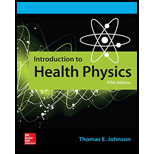
EBK INTRODUCTION TO HEALTH PHYSICS, FIF
5th Edition
ISBN: 9780071835268
Author: Johnson
Publisher: VST
expand_more
expand_more
format_list_bulleted
Concept explainers
Question
Chapter 9, Problem 9.8P
(a)
To determine
The net rate with 95% confidence limit
(b)
To determine
The coefficient of variation of the net counting rate
Expert Solution & Answer
Want to see the full answer?
Check out a sample textbook solution
Students have asked these similar questions
Pls help ASAP
Pls help ASAP
14. A boy is out walking his dog. From his house, he walks 30 m North, then 23 m East, then 120 cm South,
then 95 m West, and finally 10 m East. Draw a diagram showing the path that the boy walked, his total
displacement, and then determine the magnitude and direction of his total displacement.
Chapter 9 Solutions
EBK INTRODUCTION TO HEALTH PHYSICS, FIF
Ch. 9 - Prob. 9.1PCh. 9 - Prob. 9.2PCh. 9 - Prob. 9.3PCh. 9 - Prob. 9.4PCh. 9 - Prob. 9.5PCh. 9 - Prob. 9.6PCh. 9 - Prob. 9.7PCh. 9 - Prob. 9.8PCh. 9 - Prob. 9.9PCh. 9 - Prob. 9.10P
Ch. 9 - Prob. 9.11PCh. 9 - Prob. 9.12PCh. 9 - Prob. 9.13PCh. 9 - A counting system has a background of 360 counts...Ch. 9 - Prob. 9.15PCh. 9 - Prob. 9.16PCh. 9 - Prob. 9.17PCh. 9 - Prob. 9.18PCh. 9 - Prob. 9.19PCh. 9 - Prob. 9.20PCh. 9 - Prob. 9.21PCh. 9 - Prob. 9.22PCh. 9 - Prob. 9.23PCh. 9 - Prob. 9.24PCh. 9 - Prob. 9.25PCh. 9 - Prob. 9.26PCh. 9 - Prob. 9.27PCh. 9 - Prob. 9.28PCh. 9 - Prob. 9.29PCh. 9 - Prob. 9.31PCh. 9 - Prob. 9.33PCh. 9 - Prob. 9.34PCh. 9 - Prob. 9.35PCh. 9 - Prob. 9.38PCh. 9 - Prob. 9.39PCh. 9 - Prob. 9.44P
Knowledge Booster
Learn more about
Need a deep-dive on the concept behind this application? Look no further. Learn more about this topic, physics and related others by exploring similar questions and additional content below.Similar questions
- Pls help ASAParrow_forward12. A motorboat traveling 6 m/s, West encounters a water current travelling 3.5 m/s, South. a) Draw a vector diagram showing the resultant velocity, then determine the resultant velocity of the motorboat. b) If the width of the river is 112 m wide, then how much time does it take for the boat to travel shore to shore? c) What distance downstream does the boat reach the opposite shore?arrow_forwardLake Erie contains roughly 4.00⋅10114.00⋅1011 m3 of water. Assume the density of this water is 1000. kg/m3 and the specific heat of water is 4186 J/kg˚C. It takes 2.31x10^19 J of energy to raise the temperature of that volume of water from 12.0 °C to 25.8 ˚C. An electric power plant can produce about 1110 MW. How many years would it take to supply this amount of energy by using the 1110 MW from an electric power plant?arrow_forward
- Pls help ASAParrow_forwardPls help ASAParrow_forwardm m $2° 15. A truck is stopped at a red light. Once the light turns green, the truck accelerates forward at 1.75- that same instant, a car moving with a constant speed of 50 — passes the truck. a) How many seconds will it take for the truck to catch up to the car? S b) How many metres will the truck travel before it catches up to the car? Atarrow_forward
- Pls help ASAParrow_forwardI need help adding more information to my study guide. This is subject is physics My topic : Emission Spectrum Target Material I need information on this topic but make it as study guide form and make 5 questions and include the answers.arrow_forwardAn electron and a proton are each moving at 755 km/s in perpendicular paths as shown in (Figure 1). Find the magnitude of the total magnetic force that the electron exerts on the proton. Find the magnitude of the total electrical force that the electron exerts on the proton.arrow_forward
arrow_back_ios
SEE MORE QUESTIONS
arrow_forward_ios
Recommended textbooks for you
 University Physics Volume 1PhysicsISBN:9781938168277Author:William Moebs, Samuel J. Ling, Jeff SannyPublisher:OpenStax - Rice University
University Physics Volume 1PhysicsISBN:9781938168277Author:William Moebs, Samuel J. Ling, Jeff SannyPublisher:OpenStax - Rice University College PhysicsPhysicsISBN:9781938168000Author:Paul Peter Urone, Roger HinrichsPublisher:OpenStax College
College PhysicsPhysicsISBN:9781938168000Author:Paul Peter Urone, Roger HinrichsPublisher:OpenStax College Physics for Scientists and Engineers: Foundations...PhysicsISBN:9781133939146Author:Katz, Debora M.Publisher:Cengage Learning
Physics for Scientists and Engineers: Foundations...PhysicsISBN:9781133939146Author:Katz, Debora M.Publisher:Cengage Learning College PhysicsPhysicsISBN:9781285737027Author:Raymond A. Serway, Chris VuillePublisher:Cengage Learning
College PhysicsPhysicsISBN:9781285737027Author:Raymond A. Serway, Chris VuillePublisher:Cengage Learning Classical Dynamics of Particles and SystemsPhysicsISBN:9780534408961Author:Stephen T. Thornton, Jerry B. MarionPublisher:Cengage Learning
Classical Dynamics of Particles and SystemsPhysicsISBN:9780534408961Author:Stephen T. Thornton, Jerry B. MarionPublisher:Cengage Learning University Physics Volume 3PhysicsISBN:9781938168185Author:William Moebs, Jeff SannyPublisher:OpenStax
University Physics Volume 3PhysicsISBN:9781938168185Author:William Moebs, Jeff SannyPublisher:OpenStax

University Physics Volume 1
Physics
ISBN:9781938168277
Author:William Moebs, Samuel J. Ling, Jeff Sanny
Publisher:OpenStax - Rice University

College Physics
Physics
ISBN:9781938168000
Author:Paul Peter Urone, Roger Hinrichs
Publisher:OpenStax College

Physics for Scientists and Engineers: Foundations...
Physics
ISBN:9781133939146
Author:Katz, Debora M.
Publisher:Cengage Learning

College Physics
Physics
ISBN:9781285737027
Author:Raymond A. Serway, Chris Vuille
Publisher:Cengage Learning

Classical Dynamics of Particles and Systems
Physics
ISBN:9780534408961
Author:Stephen T. Thornton, Jerry B. Marion
Publisher:Cengage Learning

University Physics Volume 3
Physics
ISBN:9781938168185
Author:William Moebs, Jeff Sanny
Publisher:OpenStax